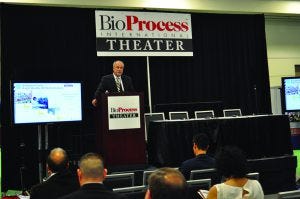- Manufacturing
- Sponsored Content
Recent Advances for Rapid Development of High-Quality, Robust Mammalian Cell CultureRecent Advances for Rapid Development of High-Quality, Robust Mammalian Cell Culture
August 11, 2016
Sponsored by Fujifilm Diosynth Biotechnology
Jozef Orpiszewski (senior director of program design, Fujifilm Diosynth Biotechnology), BPI Theater @ BIO, June 7, 2016, 11:20–11:40 am
 Fujifilm Diosynth Biotechnology is focused on accelerating bioprocesses from gene to finished products by shortening the time line, all while following quality by design (QbD) precepts and making processes as robust as possible. When this CMO started several years ago, the development time line was about 18–24 months. Using new tools, approaches, and innovations, the company has shortened that time to 15 months or less. It can assist with project management, risk management, and mitigation as well. Using a rational program design, the company works with clients to define definite goals and time lines.
Fujifilm Diosynth Biotechnology is focused on accelerating bioprocesses from gene to finished products by shortening the time line, all while following quality by design (QbD) precepts and making processes as robust as possible. When this CMO started several years ago, the development time line was about 18–24 months. Using new tools, approaches, and innovations, the company has shortened that time to 15 months or less. It can assist with project management, risk management, and mitigation as well. Using a rational program design, the company works with clients to define definite goals and time lines.
Fujifilm Diosynth Biotechnology is a global company with three sites: two in the United States (North Carolina and Texas) and one in northern England. It has introduced six commercial products. Cell culture capabilities range from small scale up to 2,000-L bioreactors.
When Fujifilm Diosynth developed its Apollo mammalian expression cell line, the original goal was not high titers, but rather to develop a cell line that could be used all the way through commercial manufacturing. This included developing a culture medium for the cell line that could accelerate growth. The company ended up doubling its original titers by selecting cell line, medium, and feed together. One bottleneck in bioprocessing was cell banking, so the company built its own cell banking facilities.
Before starting a project, Fujifilm Diosynth analyzes it for potential problems and assesses risks for determining how to mitigate them. To shorten the overall time line, the company speeds up experiments and analysis while generating more data than in the past, including information about molecular behavior. It uses effective program management, which is key in tracking milestones. The company has tools for accelerating upstream production and downstream production (chromatography) time lines as well. It can screen different conditions by looking at five types of resin in chromatography columns and three different pH levels using automated systems.
During process development, using good analysis is an important part of screening. Fujifilm Diosynth Biotechnology looks comprehensively at protein attributes such as glycosylation, aggregation, oxidation, and fragmentation. It generates hundreds of samples over five days, then analyzes those with a number of tools. The company continuously updates its analytic capabilities with the newest technology. It can generate 200 samples in two hours for rapid analysis, spending less than 10 minutes per sample. Scientists get data on the same day of testing, so they can then rationally design the next step in a process.
Fujifilm Diosynth Biotechnology reached its goal of shortening the drug-development time line to 15 months while following quality by design (QbD) principles and generating robust processes without cutting corners. Cell line development was reduced from nine months to six months by implementing all these tools.
You May Also Like






